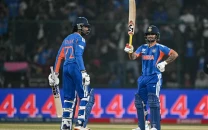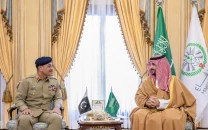Learning intolerance through textbooks
I hope that one day, our textbooks will discard the sentiments of hatred and teach our children the truth.

My history books said nothing about the Rajputs who were the real builders of Lahore and the direct ancestors of many families in Punjab. Those books spoke nothing about Rani Lakshmi Bai, the Rani of Jhansi; Mangal Pandey or Tantya Tope who fought gallantly against the East India Company in 1857. They spoke nothing of Bhagat Singh, Udham Singh, Sukhdev and Kartar Singh for their efforts for liberation. While my Urdu textbook contained generous excerpts of poetry from the likes of Iqbal and Hali, it completely forgot to mention Firaq Gorakhpuri. Yes, all memories of united India were erased from my mind.
There was some mention of how Muslims of India were subjected to oppression by the Indian National Congress, particularly during the years of Congress ministries. But the textbooks completely forgot to highlight that the Congress was a secular party and many of its leaders were Muslims, too. My school did not teach me that our leaders, including Mohammad Ali Jinnah, would stand up to defend a freedom fighter like Lokmanya Bal Gangadhar Tilak; that Mr Jinnah was born into an Ithna-Asheri Shi’ite family; and that he lived as a tolerant, liberal individual and favoured secularism. I have grown up saluting a founder who adorned the Jinnah cap and sheerwani and looked rigid and Islamic. I was never introduced to the liberal, secular man who dressed elegantly and enjoyed reading Shakespeare.
As I explored the world of books on my own and met people of different communal backgrounds, I came to know that I have much in common with people on the other side of the border. The hatred was an effort in futility. I hope that one day, our textbooks will discard the sentiments of hatred and teach our children the truth. As an independent thinker, I know that the disease of intolerance can only be treated at the grassroots level and we need to fix the problem at its root.
Ayesha Aizaz Qureshi
Published in The Express Tribune, August 28th, 2012.



















COMMENTS
Comments are moderated and generally will be posted if they are on-topic and not abusive.
For more information, please see our Comments FAQ